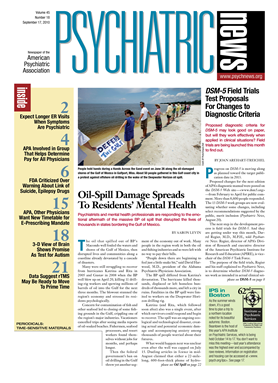New Jersey is delaying indefinitely the implementation of a new law that would give families a greater role in determining whether a relative is civilly committed to outpatient treatment.
The administration of Gov. Chris Christie (R) announced in August that the state's new involuntary outpatient commitment law (S 735), enacted in 2009, would not take effect that month as scheduled, because no funding was set aside by the legislature to fund expanded treatment services. The law was designed to allow families to seek a court order to force relatives with mental illness into an outpatient treatment program if a psychiatrist deemed it necessary because the person posed a risk to himself or herself or others.
The delay in implementation came as the state continued to wrestle with severe budget deficits, which led Christie to further cuts in state-agency budgets—including more than $11 million from community mental health programs—since taking office earlier this year.
The decision to delay implementation drew fire from supporters of the law, which was enacted after several high-profile murders were committed in the state in recent years by people with diagnosed but untreated mental illness.
“This law is absolutely necessary to prevent future tragedies,” said state Sen. Jim Whelan (D), in a written statement. “Every day we wait, we risk hearing of another fatal incident that could have been prevented. While the administration is saying we cannot afford to offer this program, I am dumbfounded, because the truth is, we cannot afford to wait.”
State mental officials agreed, however, that the new commitment law required additional funding for treatment.
“The mental health agencies were particularly concerned because the burden of this [law] falls on them, and no money was set aside,” said Margaret Tompsett, M.D., president of the New Jersey Psychiatric Association, in an interview with Psychiatric News.
Public- and private-sector psychiatrists in the state disagreed with some mental health advocates, who argued that the state's nonpartisan Office of Legislative Services had determined that there was sufficient capacity in the current system to initiate the program. Tompsett criticized what she described as the state's initial approach to the law, which apparently included implementing it and only then identifying needed funding based on the resulting demand for treatment.
“There's insufficient funding for those who want treatment, much less for those who don't want treatment,” Tompsett said.
The financial report accompanying the measure when it was considered by the state legislature noted that if the state government was unable to identify sufficient treatment funds from elsewhere in its budget, then “additional monies may be required.”
Christie administration officials said they plan eventually to find the necessary funding to implement the law but gave no timelines.
Tompsett highlighted the treatment benefits that a fully funded outpatient civil commitment law, such as a recently implemented version in New York, can offer to people suffering from mental illness.
Meanwhile, Tompsett said that psychiatrists in the state have begun discussing whether they are fully utilizing the limited civil-commitment authority that they already possess. The older civil-commitment law allows psychiatrists to order patients to comply with their medical regimen for three months after they are released from involuntary inpatient care or face a return to the hospital. Wider use of the older law may have prevented some problems with patients who became noncompliant soon after their discharge from a psychiatric hospital. The new law will extend required outpatient medical compliance to six months after hospital discharge, but also require a judge to issue the orders.
